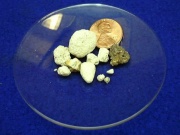Difference between revisions of "Phosphorus"
Jump to navigation
Jump to search
m (Text replace - "== Authority ==" to "== Sources Checked for Data in Record ==") |
|||
| (3 intermediate revisions by 2 users not shown) | |||
| Line 2: | Line 2: | ||
== Description == | == Description == | ||
| − | A nonmetallic element. Phosphorus has an abundance of 0.12 % in the earth's crust. Discovered in 1669 by Hennig Brand as a component in urine, it is now obtained from phosphate containing rocks such as [ | + | A nonmetallic element. Phosphorus has an abundance of 0.12 % in the earth's crust. Discovered in 1669 by Hennig Brand as a component in urine, it is now obtained from phosphate containing rocks such as [[apatite|apatite]], chlorapatite, fluorapatite, and [[vivianite|vivianite]]. Phosphorus is also found in [[bone%20ash|bone ash]] (calcium phosphate). Pure phosphorus occurs naturally in three allotropic forms: white (or yellow), red and black. |
| − | + | * White phosphorus is a soft, waxy, transparent solid that is soluble in water, [[ethyl%20alcohol|Ethanol]], and [[carbon%20disulfide|carbon disulfide]]. It exhibits phosphorescence at room temperature. | |
| + | * Red phosphorus is insoluble in most solvents and catches fire when heated in air. It is used to make [[phosphor%20bronze|Phosphor bronze]], metallic phosphides, safety matches and fertilizers. | ||
| + | * Black phosphorus is insoluble in most solvents and is the most stable form of phosphorus. It is made by heating white phosphorus and it resembles graphite in texture and properties. | ||
| − | + | == Synonyms and Related Terms == | |
| − | + | P; P4; Fosfor (Ned.); phosphore (Fr.); Phosphor (Deut.); fosforo (It., Sven.); Fósforo (Port., Esp.); white phosphorus; yellow phosphorus; red phosphorus; black phosphorus | |
| − | == | + | == Risks == |
| − | + | * Highly toxic by ingestion and inhalation. | |
| + | * Skin contact causes burns. | ||
| + | * Highly flammable. Ignites spontaneously in air or organic materials. | ||
| + | * ThermoFisher: [https://www.fishersci.com/store/msds?partNumber=AC215755000&productDescription=PHOSPHORUS+PENTOXIDE%2C+P.+500GR&vendorId=VN00032119&countryCode=US&language=en SDS] | ||
| + | == Physical and Chemical Properties == | ||
{| class="wikitable" | {| class="wikitable" | ||
|- | |- | ||
| Line 23: | Line 29: | ||
|- | |- | ||
! scope="row"| Melting Point | ! scope="row"| Melting Point | ||
| − | | 44.1 (white) | + | | 44.1 C (white) |
|- | |- | ||
! scope="row"| Density | ! scope="row"| Density | ||
| − | | 1.82 (white) | + | | 1.82 g/ml (white) |
|- | |- | ||
! scope="row"| Molecular Weight | ! scope="row"| Molecular Weight | ||
| Line 32: | Line 38: | ||
|} | |} | ||
| − | == | + | == Resources and Citations == |
| − | |||
| − | |||
| − | |||
| − | |||
| − | |||
| − | |||
| − | |||
| − | |||
| − | |||
| − | |||
| − | + | * Web Elements: [http://www.webelements.com/webelements/elements/text/P/key.html Website] | |
* G.S.Brady, ''Materials Handbook'', McGraw-Hill Book Co., New York, 1971 Comment: p. 603 | * G.S.Brady, ''Materials Handbook'', McGraw-Hill Book Co., New York, 1971 Comment: p. 603 | ||
Latest revision as of 09:53, 22 October 2022
Description
A nonmetallic element. Phosphorus has an abundance of 0.12 % in the earth's crust. Discovered in 1669 by Hennig Brand as a component in urine, it is now obtained from phosphate containing rocks such as Apatite, chlorapatite, fluorapatite, and Vivianite. Phosphorus is also found in Bone ash (calcium phosphate). Pure phosphorus occurs naturally in three allotropic forms: white (or yellow), red and black.
- White phosphorus is a soft, waxy, transparent solid that is soluble in water, Ethanol, and Carbon disulfide. It exhibits phosphorescence at room temperature.
- Red phosphorus is insoluble in most solvents and catches fire when heated in air. It is used to make Phosphor bronze, metallic phosphides, safety matches and fertilizers.
- Black phosphorus is insoluble in most solvents and is the most stable form of phosphorus. It is made by heating white phosphorus and it resembles graphite in texture and properties.
Synonyms and Related Terms
P; P4; Fosfor (Ned.); phosphore (Fr.); Phosphor (Deut.); fosforo (It., Sven.); Fósforo (Port., Esp.); white phosphorus; yellow phosphorus; red phosphorus; black phosphorus
Risks
- Highly toxic by ingestion and inhalation.
- Skin contact causes burns.
- Highly flammable. Ignites spontaneously in air or organic materials.
- ThermoFisher: SDS
Physical and Chemical Properties
| Composition | P (atomic no. 15) |
|---|---|
| CAS | 7723-14-0 |
| Melting Point | 44.1 C (white) |
| Density | 1.82 g/ml (white) |
| Molecular Weight | atomic wt = 30.97376 |
Resources and Citations
- Web Elements: Website
- G.S.Brady, Materials Handbook, McGraw-Hill Book Co., New York, 1971 Comment: p. 603
- Richard S. Lewis, Hawley's Condensed Chemical Dictionary, Van Nostrand Reinhold, New York, 10th ed., 1993
- Robert Fournier, Illustrated Dictionary of Practical Pottery, Chilton Book Company, Radnor, PA, 1992
- Van Nostrand's Scientific Encyclopedia, Douglas M. Considine (ed.), Van Nostrand Reinhold, New York, 1976
- Random House, Webster's Encyclopedic Unabridged Dictionary of the English Language, Grammercy Book, New York, 1997
- The Merck Index, Martha Windholz (ed.), Merck Research Labs, Rahway NJ, 10th edition, 1983 Comment: entry 7503
- The American Heritage Dictionary or Encarta, via Microsoft Bookshelf 98, Microsoft Corp., 1998
